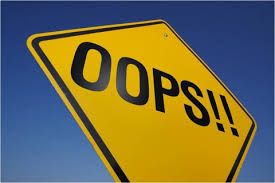The above is a quote from the classic TED talk by Sir Ken Robinson.
Here is the full paragraph:
… kids will take a chance. If they don’t know, they’ll have a go.Am I right? They’re not frightened of being wrong. I don’t mean to say that being wrong is the same thing as being creative. What we do know is, if you’re not prepared to be wrong, you’ll never come up with anything original — if you’re not prepared to be wrong. And by the time they get to be adults, most kids have lost that capacity. They have become frightened of being wrong. And we run our companies like this. We stigmatize mistakes. And we’re now running national education systems where mistakes are the worst thing you can make. And the result is that we are educating people out of their creative capacities.”
I show this video to all my classes; in fact I just showed it to two of my classes yesterday. I tell the students while the content may not have any immediate applicability to what we are studying in class, it offers some valuable life lessons and food for thought.
And then while I was reading the paper today, I experienced a bit of deja vu.
Dan Ariely, the great behavioral economist, has a column that appears frequently on Saturdays in the Wall Street Journal in which he answers readers’ questions.
Today, someone sent Dan the following question:
Is it smart to fire someone for failing? We often hear about politicians, generals and executives who blow it and then lose their jobs, but how can anyone gain experience if failure means their dismissal?
And here is part of Dan’s reply:
This problem is worse than you might think. Organizations that don’t tolerate failure not only stop their employees from learning from their mistakes but also create a risk-averse culture that fears trying anything new.
A related problem is that organizations generally reward (and punish) people based on the outcomes of their decisions, not on the quality of their decisions. In general, you’d hope that good decisions would lead to good outcomes, but that causal link rests on probabilities, not certainties—so reward and punishment are often misapplied.
… we should reward and retain people who know how to make good decisions, but most of the time, we just reward good outcomes. As long as organizations behave this way, we will be stuck with conservative, risk-avoiding behavior, and we will keep firing some of the wrong people.
I’ve highlighted the parts of Ken Robinson’s talk that seem to be eerily similar to Dan Ariely’s response.
Ken Robinson’s TED talk was in 2006, and despite being viewed over 40 million times (between the TED site and YouTube), it seems as if nine years later nothing has changed in terms of how mistakes are viewed in business.
This point is also highlighted in part of an interview Gary Vaynerchuk had this year with Jack and Suzy Welch.
All three of them point out the value of making mistakes (but not too often), but also note the fear often associated with doing so.
And if Ken Robinson, Dan Ariely, Gary Vaynerchuck, and Jack and Suzy Welch aren’t enough to convince you, then perhaps Neil Gaiman, in his incredible 2012 commencement speech at Philadelphia’s University of the Arts says it best:
And now go, and make interesting mistakes, make amazing mistakes, make glorious and fantastic mistakes. Break rules. Leave the world more interesting for your being here. Make good art.
My hope is that people take up such a challenge, and that our businesses are willing to support its employees when they do make “glorious and fantastic mistakes”. After all, if you’re not willing to make a mistake you’ll never come up with anything original…


So true….Carol Dweck a psychologist from Stanford studied people from an early age through early adulthood… findings of her research those individuals who had failed at things but looked for ways to fix that failure, were far more successful in life than those that did not. Much of her work focused on kids who were exposed to subliminal messages that being smart was good, working fast to complete something meant you were smart, smart kids do not need to study, failure was not an option . As life became more challenging these kids looked for ways to avoid challenges because they did not want to risk failure, because they were taught that failure was not an option. In some cases they even self-sabotaged themselves so they could brush off a failure because they did not take the task seriously. She also found that kids of average ability or below average ability who worked at something even after failing at it once or twice became more successful as adults. These kids developed strategies to address failure which in turn strengthened their weaknesses.
LikeLike
Daryl, thanks for sharing that research which once again shows the benefit of hard work.
LikeLike